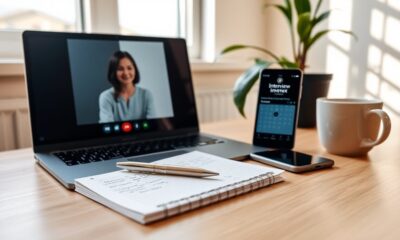Job Interview
13 Insider Secrets to Excel in Your Senior Director of Business Development Interview – #9 Will Astonish You!
Wondering how to impress in your Senior Director interview? Discover insider secrets that will elevate your game and leave a lasting impact!

To excel in your Senior Director of Business Development interview, focus on crafting insightful questions that show your understanding of the company's mission and market strategy. This isn't just about answering questions but engaging in a two-way conversation. Ask about their growth strategies and how you can contribute to their success. By demonstrating your industry knowledge and aligning your vision with theirs, you'll stand out as a candidate. Plus, don't underestimate the power of follow-up—expressing gratitude in a timely manner can solidify your impression. Stick around, and you might just uncover more surprising tactics to enhance your interview game!
Key Takeaways
- Master the STAR method to effectively articulate your achievements and problem-solving abilities during behavioral and situational questions.
- Showcase your understanding of industry metrics and trends to demonstrate your market knowledge and strategic vision for business growth.
- Prepare insightful questions about the company's goals and growth strategies, reflecting your engagement and interest in the Senior Director role.
- Tailor your resume and cover letter with quantifiable achievements and relevant keywords to navigate applicant tracking systems effectively.
- Maintain a confident mindset and practice mock interviews to enhance your communication skills and prepare for emerging interview technologies.
Introduction to Job Interviews

Job interviews are a critical gateway to your career aspirations, and understanding their structure can significantly impact your success. A job interview typically consists of multiple segments, including HR interviews, technical assessments, and final validation interviews with higher management or executives. Each segment serves a specific purpose, helping employers gauge your fit for the role and the company.
To excel, you'll need to prepare thoroughly. Dive into the company's mission, business model, and competitive landscape. This not only shows your genuine interest but also aligns your values with theirs. It's recommended that you allocate at least three hours for preparation. Use this time to refine your responses and familiarize yourself with common interview questions and performance metrics.
Don't forget the importance of asking insightful questions during the job interview. This demonstrates your curiosity and engagement, signaling that you understand the role's expectations and challenges. Lastly, consider practicing through mock interviews or role-playing scenarios. These exercises enhance your communication skills and help you articulate your value proposition effectively. By grasping these elements, you'll position yourself as a strong candidate in any job interview.
Preparing for the Interview
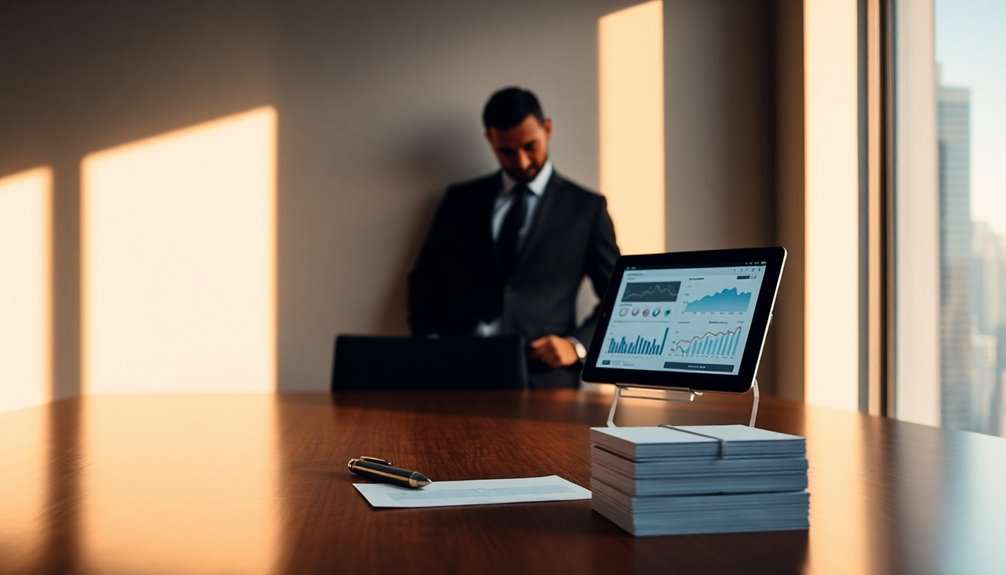
To ace your interview, you need to start with thorough research and self-assessment. Review your resume and application materials, making sure they align with the role and the company. Don't forget to practice key interview techniques that highlight your skills and experiences effectively. Additionally, consider the importance of content quality in your preparation, as it can enhance your credibility during discussions.
Research and Self-Assessment
Before stepping into a business development interview, immersing yourself in the company's mission, values, and business model is crucial. This research and self-assessment not only helps you tailor your responses but also showcases your genuine interest in the organization. Spend at least three hours preparing by delving into the company's products, services, and market positioning.
Next, analyze the competitive landscape to understand your potential role in distinguishing the company from its rivals. This insight will also equip you with relevant questions to ask during the interview.
Don't forget to assess your own skills and experiences against the job description. Identify key achievements that align with the expectations for a Senior Director of Business Development role. Engage in self-reflection to articulate how your background and leadership style can add value to the company's growth objectives. Additionally, consider how your understanding of diversification strategy can enhance the company's market presence and financial stability.
Resume and Application Preparation
Crafting a compelling resume and application is essential for making a strong impression in your business development interview. Start by tailoring your resume to highlight achievements relevant to the role, using quantifiable metrics like percentage increases in sales or client acquisition rates. This gives potential employers a clear picture of your impact. Additionally, understanding how to navigate complex situations can demonstrate your ability to handle challenging business environments effectively.
Your application should include a strong cover letter that demonstrates your understanding of the company's mission, culture, and market position. This personal touch can set you apart from other candidates. Don't forget to incorporate keywords from the job description into both your resume and application; this helps you pass through Applicant Tracking Systems (ATS) effectively. Additionally, you may consider the benefits of automating contributions to ensure financial stability, which showcases your strategic thinking.
Additionally, create a section on professional development and certifications to showcase your commitment to continuous learning in the business development field. Finally, prepare a list of strategic accomplishments that align with the company's goals. These will not only enhance your resume and application preparation but also give you talking points that demonstrate your readiness for a senior director role. Furthermore, understanding the importance of IRA investment strategies can provide insights into making informed financial decisions that may be relevant in discussions during your interview. By focusing on these elements, you'll significantly boost your chances of making a lasting impression.
Interview Preparation Techniques
Effective interview preparation is crucial for standing out in business development roles. Start by allocating at least three hours to dive deep into the company's mission, competitors, and culture. This knowledge will help you tailor your interview questions and answers effectively. Conduct mock interviews to simulate real-world scenarios, allowing you to practice your sales techniques and refine your communication skills. Additionally, understanding IRAs can be integrated with state-sponsored retirement plans can provide valuable insights into financial decision-making processes relevant to business development. Furthermore, being aware of Bitcoin mining's impact on energy consumption can enhance your discussions around sustainable business practices.
Prepare specific, quantifiable examples of your past achievements in business development. This demonstrates your effectiveness in driving growth and hitting sales targets. Create a detailed action plan outlining potential strategies for business development to present during the interview. This showcases your proactive approach and strategic mindset. Understanding total overhead variance can also help in formulating your action plan effectively.
Finally, formulate insightful questions about the company's sales cycles, lead qualification processes, and current challenges. This not only shows your curiosity but also highlights your strategic thinking. By thoroughly preparing, you'll feel more confident and ready to tackle any interview questions that come your way. Remember, the goal is to create a compelling narrative that positions you as the ideal candidate for the Senior Director of Business Development role.
Dressing for Success
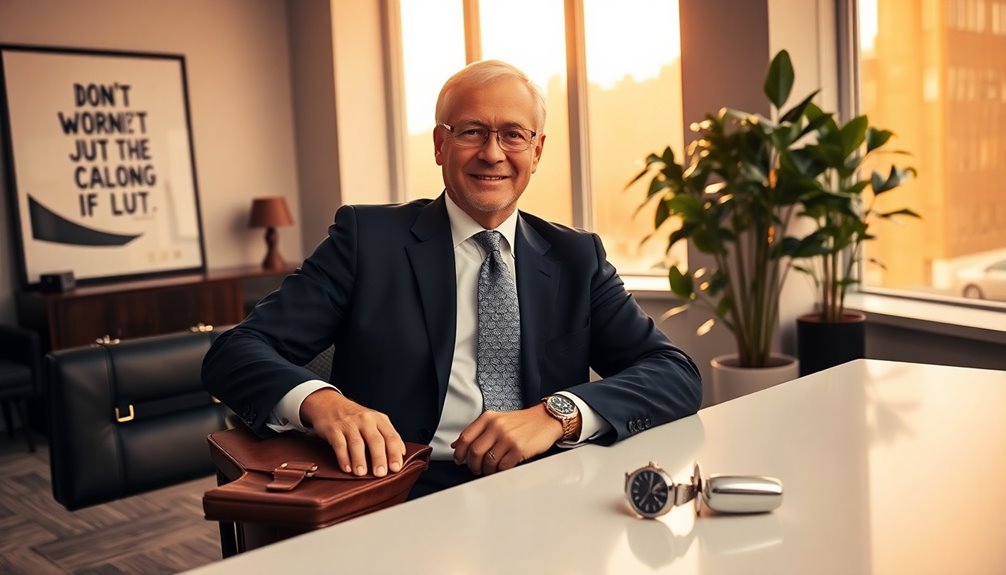
When it comes to dressing for a Senior Director of Business Development interview, your outfit speaks volumes about your professionalism. You'll want to choose attire that fits well and matches the company culture, ensuring you make a strong first impression. Let's explore some essential guidelines for both general and gender-specific attire, along with tips for seasonal and casual looks.
General Attire Guidelines
Dressing for success can significantly impact your chances in a Senior Director of Business Development interview. Wearing business professional attire, like a tailored suit for men or a formal dress or suit for women, creates a powerful first impression. Stick to conservative color choices; navy, black, or gray suits are ideal, while white or light blue shirts can add a touch of professionalism without being overpowering.
Your grooming and personal hygiene are just as crucial. Neat hair, polished shoes, and minimal accessories enhance your overall appearance and boost your confidence. Before the interview, research the company culture to align your attire accordingly. Some industries may allow for business casual options while still conveying professionalism, so adapt your business development strategy to fit the situation.
Choose well-fitted clothing that's comfortable, allowing you to focus on your interview performance without the distraction of adjusting your attire. A confident demeanor can set you apart, making you more memorable to interviewers. Remember, the right attire not only reflects your professional image but also demonstrates your understanding of the business environment you're stepping into. Additionally, showcasing strong communication skills during the interview can further enhance your overall impression.
Gender-Specific Attire Tips
Choosing the right outfit for a business development interview can set the tone for your success. For men, opt for a well-tailored suit in a neutral color like navy or charcoal. Pair it with a crisp white or light blue dress shirt and a conservative tie to convey professionalism and confidence.
Women should consider a tailored blazer with dress pants or a knee-length skirt in solid, muted colors. Combine this with a blouse that complements the outfit to maintain a polished and authoritative appearance.
When it comes to accessories, keep them minimal and understated. Men can wear a classic watch, while women might choose simple jewelry that doesn't distract from their overall look.
Footwear matters too. Men should wear polished leather shoes, and women should go for closed-toe heels or flats that are both stylish and comfortable for extended wear.
Finally, ensure your clothing fits well, is clean, and is pressed. Well-fitted attire enhances self-confidence and creates a positive first impression during the interview. Use these gender-specific attire tips to help you stand out and make a lasting impact. Additionally, consider wearing clothing made from eco-friendly materials as it reflects a commitment to sustainability and responsibility.
Seasonal and Casual Attire
As you prepare for a business development interview, consider how seasonal and casual attire can impact your first impression. Your choice of attire should align with the company's culture and industry standards. In warmer months, opt for lighter fabrics, while in colder seasons, layering is key. This not only keeps you comfortable but also maintains a polished look, regardless of office temperatures.
If the company allows for casual attire, remember that it should still reflect professionalism. Choose well-fitted clothing and appropriate footwear to ensure you look put together. Minimal and tasteful accessories can enhance your overall appearance without being distracting.
Before the interview, research the company's dress code. Understanding whether to go for business casual or formal attire can make a significant difference in how you're perceived. Dressing appropriately showcases your awareness of the company's environment and your commitment to fitting in.
Ultimately, your attire is more than just clothing; it's a reflection of your professionalism and attention to detail. So, take the time to choose your outfit wisely, and you'll set the stage for a successful interview.
Mastering Interview Questions
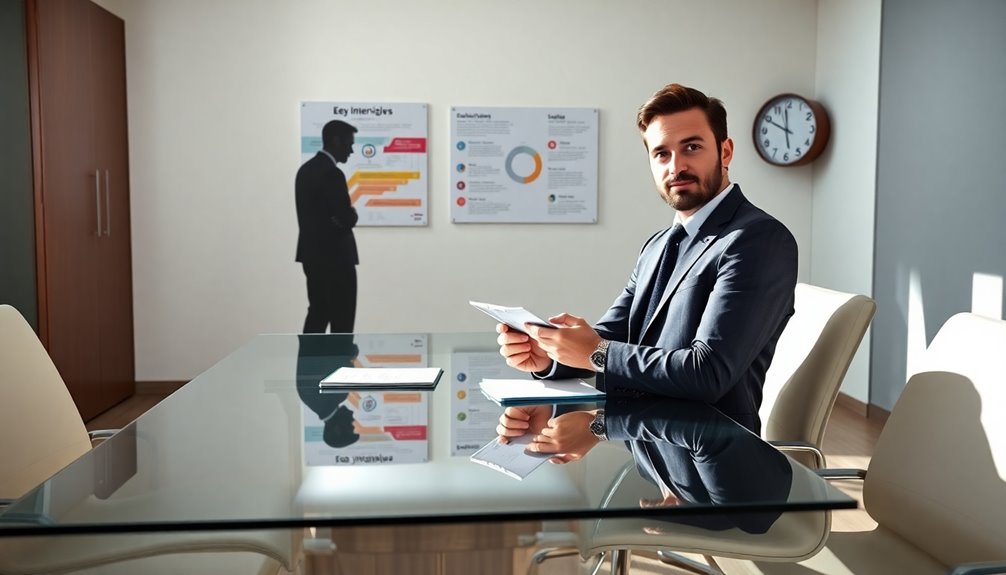
Mastering interview questions is crucial for your success in a Senior Director of Business Development role. You'll face common, behavioral, and situational questions that demand thoughtful responses, so be prepared to highlight your past achievements. Additionally, industry-specific inquiries and advanced questioning techniques can set you apart, so understanding what to expect will give you an edge.
Common Interview Questions
In business development interviews, you'll likely encounter a range of common interview questions that target your experience and skills. Be prepared to discuss your track record in generating leads and achieving sales targets. Interviewers want to know how you've developed new business opportunities in the past. They may ask about your understanding of the company's customer verticals, sales cycles, and the challenges the team currently faces.
You should also expect questions that assess your past achievements, such as percentage increases in revenue or successful partnerships you've fostered. Highlighting these accomplishments can demonstrate your capability in driving results. Interviewers often focus on your negotiation skills and how you handle objections, emphasizing the need for effective communication techniques tailored to client needs.
Articulating a clear vision for business growth is crucial. Be ready to outline specific tools and goals for the proposed business development mission during the interview. By preparing for these common interview questions, you'll position yourself as a strong candidate who understands the demands and expectations of the Senior Director of Business Development role.
Behavioral and Situational Questions
Behavioral and situational questions play a crucial role in business development interviews by helping interviewers assess your problem-solving abilities and leadership qualities. These questions often focus on your past experiences and how you've responded to challenges. To prepare effective answers, think of specific, quantifiable examples from your previous roles that demonstrate your skills and achievements. For instance, leading a team to exceed sales targets by a notable percentage can showcase your capability.
Using the STAR method—Situation, Task, Action, Result—can help you structure your responses clearly. This ensures you highlight key competencies while providing relevant context. Expect situational questions that gauge how you'd handle hypothetical scenarios. Practicing responses to common scenarios in business development can boost your confidence and readiness.
Moreover, anticipate questions regarding conflict resolution, team dynamics, and strategic decision-making. By preparing these answers, you’ll display your critical thinking and adaptability, essential traits for a senior role. Remember, the more specific and relevant your answers, the more impact you’ll make during your interview. Also, be ready to discuss examples of successful project management, handling difficult personalities within a team, and how you prioritize tasks under tight deadlines. These experiences will help demonstrate your ability to effectively lead and navigate complex situations. Remember, the key to acing your senior manager interview is thorough preparation and practicing your responses to common questions. For more senior manager interview tips, consider seeking out a mentor or utilizing online resources to refine your strategy and boost your confidence.
Industry-Specific Questions
Industry-specific questions can make or break your business development interview, as they demonstrate your understanding of the market and its unique challenges. To master these questions, start by familiarizing yourself with key metrics and trends relevant to your sector. This knowledge not only enhances your credibility but also shows you're attuned to the industry's pulse.
Prepare to discuss common challenges faced by companies in your field. Craft insightful responses that showcase your strategic thinking and adaptability. Tailor your answers to reflect your experience with specific market conditions, customer behaviors, and competitive landscapes that relate to the role.
Don't shy away from highlighting your past successes in generating leads and closing deals within the industry. Use quantifiable metrics to illustrate your effectiveness. Anticipate questions about how you'd leverage your industry knowledge to drive growth. Be ready to propose innovative strategies that align with the company's goals.
Advanced Question Techniques
Mastering advanced question techniques can set you apart in business development interviews. To do this effectively, prepare targeted inquiries that show you understand the company's mission, customer base, and industry challenges. It's crucial to engage the interviewer with insightful questions about their growth strategies and the expected outcomes for the Senior Director role. This not only demonstrates your proactive approach but also your commitment to contributing to their success.
Utilize the STAR method (Situation, Task, Action, Result) to structure your responses. This technique helps you present concrete examples of past achievements that highlight your strategic thinking and analytical abilities. Anticipate common interview questions and develop persuasive arguments that underscore your strong communication skills.
Don't shy away from asking questions that delve into the company's current market positioning and competitive landscape. This shows that you're not just interested in the role but also invested in the company's future. By applying these advanced question techniques, you can effectively showcase your knowledge and enthusiasm, significantly increasing your chances of success in the interview.
Asking Insightful Questions
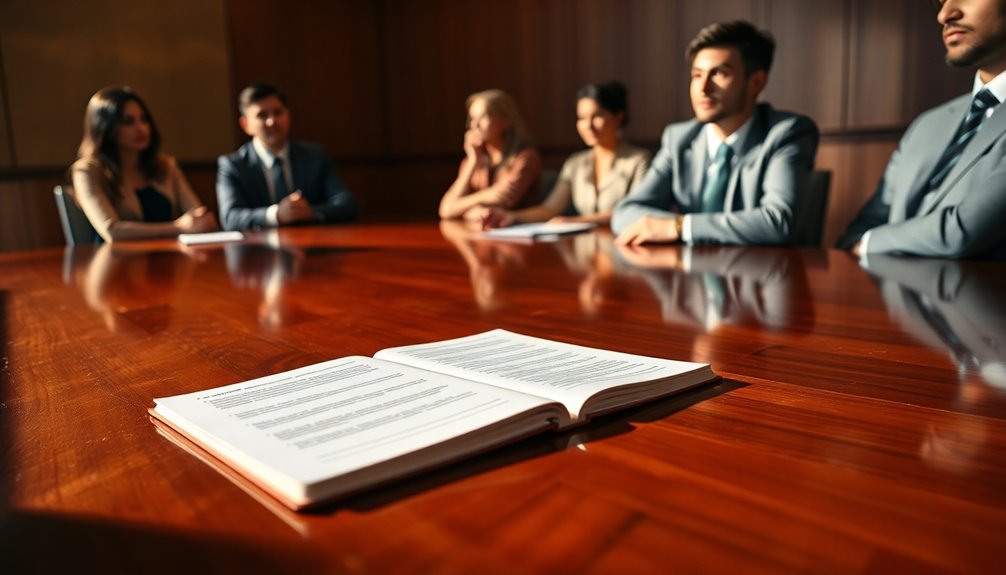
Asking insightful questions can set you apart in a business development interview. You'll want to focus on strategic inquiries that show your understanding of the company's challenges and goals, as well as closing questions that clarify expectations for your role. This approach not only highlights your curiosity but also demonstrates your readiness to contribute to the team's success.
Strategic Questions to Impress
How can you truly stand out in a business development interview? By asking strategic questions that showcase your understanding of the company and your eagerness to contribute. Start by inquiring about the company's customer verticals and sales cycles. This not only highlights your knowledge of their business model but also your interest in driving growth.
Next, delve into the lead qualification processes and any current challenges the team faces. This demonstrates your proactive approach and readiness to engage with existing issues. Don't shy away from clarifying expectations around annual goals and variable compensation structures; this shows your commitment to aligning your performance with the company's objectives.
Additionally, asking about the onboarding process for Business Developers can reflect your desire to seamlessly integrate into the team and adapt to the company culture. Finally, wrap up the interview by posing insightful questions about future business development initiatives. This reinforces your enthusiasm for the role and showcases your strategic thinking capabilities. By asking these strategic questions, you'll leave a lasting impression and position yourself as a valuable candidate.
Closing Questions
Closing questions in a business development interview can make all the difference in how you're perceived as a candidate. As you wrap up, consider asking insightful questions that not only demonstrate your knowledge of the industry but also your genuine interest in the manager role. Start by inquiring about the company's sales cycles and lead qualification processes. This shows your curiosity and understanding of essential business development dynamics.
Don't shy away from discussing the current challenges faced by the team. This reveals your strategic thinking and eagerness to help the team overcome obstacles. Questions about the onboarding processes for Business Developers can indicate how the company invests in new hires and where you might fit in.
Additionally, clarifying expectations around annual goals and variable compensation structures highlights your focus on aligning personal objectives with company performance metrics. Finally, engage the interviewer with strategic questions about customer verticals and market trends. This reinforces your expertise and interest in the role, setting you apart from other candidates. Remember, your closing questions can leave a lasting impression, so make them count!
Effective Communication and Presentation
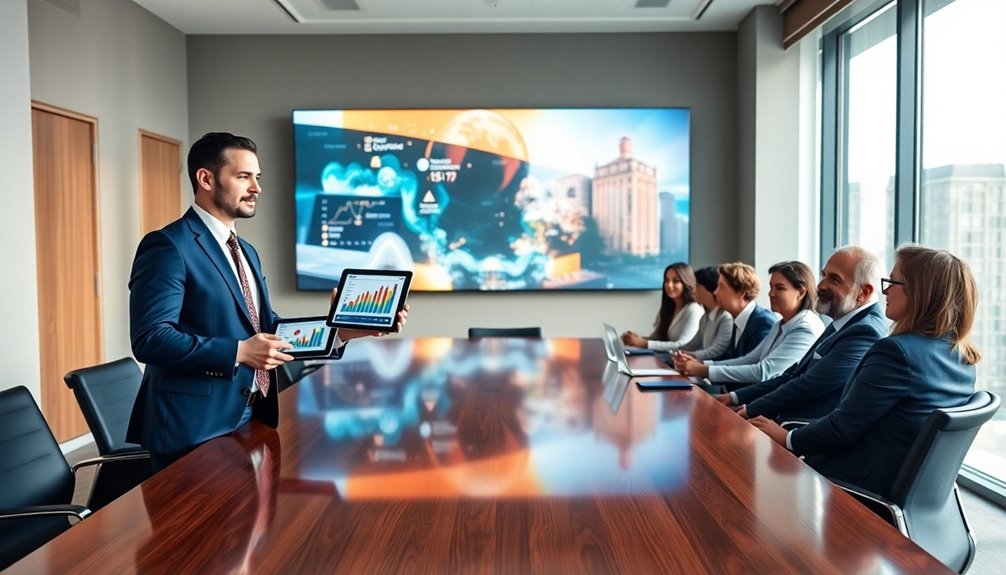
In business development interviews, crafting the perfect response is key to showcasing your skills and insights. Your body language and confidence can significantly impact how your message is received, so be mindful of both as you engage with the interviewer. By mastering these elements, you'll communicate your value more effectively and leave a lasting impression.
Crafting the Perfect Response
Mastering effective communication in business development interviews is crucial for making a lasting impression. When you're crafting the perfect response, focus on clearly articulating your business development strategies and how they align with the company's goals. This showcases your understanding of the industry and your fit for the role.
To strengthen your answers, tailor your responses with specific, quantifiable achievements from your past roles. Mention percentage increases in sales or successful lead conversions to demonstrate your impact. Utilize structured responses that break down complex ideas into manageable parts, making it easier for interviewers to grasp your key points.
Anticipate common Manager interview questions and prepare persuasive, relevant answers that highlight your unique skills and experiences. This preparation not only boosts your confidence but also ensures you can communicate effectively under pressure.
Finally, engage the interviewer by asking insightful questions that reflect your knowledge of the company and your strategic vision for business development. This reinforces your communication skills and shows your genuine interest in the role, making your responses even more compelling.
Body Language and Confidence
Confidence plays a pivotal role in how you present yourself during business development interviews. Positive body language significantly enhances your perceived confidence, making you more likable to interviewers. Remember, non-verbal communication accounts for a staggering 93% of how messages are perceived, so it's crucial to convey confidence through effective body language.
Start by maintaining eye contact and adopting an open posture. Good posture and controlled movements can elevate your presence, leaving a favorable impression. Additionally, mirroring the interviewer's body language can create rapport and demonstrate your engagement, which is essential for high-stakes interviews.
Don't underestimate the power of a firm handshake and a warm smile at the beginning and end of the interview. These simple gestures can set a positive tone and reinforce your professionalism and confidence. Practicing these techniques beforehand can help you feel more relaxed and assured during the actual interview.
Ultimately, mastering body language is about more than just looking confident; it's about creating a genuine connection with your interviewer, which can be a game-changer in securing that senior director role.
Post-Interview Strategies
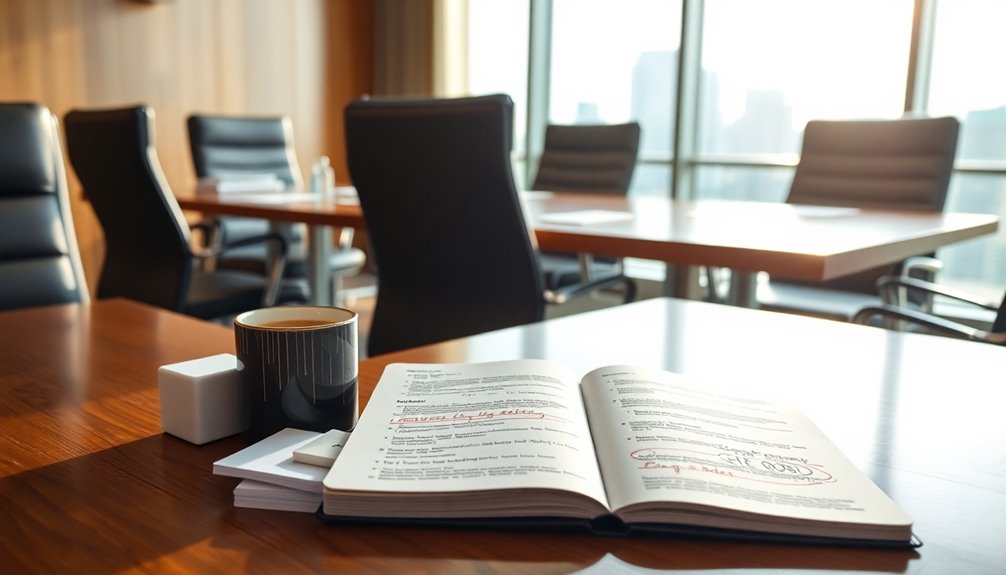
After your interview, it's crucial to engage in thoughtful follow-up communications to keep your candidacy fresh in the interviewers' minds. Handling offers and rejections gracefully also sets the stage for future opportunities, so be prepared for any outcome. Let's explore how to approach these key post-interview strategies effectively.
Follow-Up Communications
A thoughtful follow-up communication can significantly impact your chances of landing a business development role. Within 24 hours of your interview, send a personalized thank-you email to express your appreciation for the opportunity and reiterate your interest in the position. In this follow-up communication, highlight specific points discussed during the interview that showcase how your skills align with the company's needs. This reinforces your fit for the role and keeps you top of mind.
Additionally, address any questions or concerns that came up during the interview. This not only demonstrates your proactive approach but also your problem-solving abilities, which are crucial for a senior director position. Keep your message concise and professional; aim for clarity and relevance to maintain the interviewer's engagement.
If appropriate, consider suggesting a brief follow-up call to further demonstrate your enthusiasm and willingness to engage in the hiring process. Remember, effective follow-up communications can set you apart from other candidates and underscore your commitment to the role. Don't underestimate the power of a well-crafted follow-up—it could be the key to your success!
Handling Offers and Rejections
Receiving an offer or facing a rejection can significantly shape your job search experience. When you get an offer, take the time to evaluate the terms carefully. Consider how they align with your career goals, and don't hesitate to negotiate if the offer doesn't meet your expectations. Companies are often willing to discuss salary, benefits, and growth opportunities to secure the right candidate.
In the case of a rejection, it's important to maintain a positive and professional demeanor. Politely request constructive feedback from the interviewer; this can help you identify areas for improvement and enhance your future interview performance. Even if the news isn't what you hoped for, how you handle rejections can leave a lasting impression.
Regardless of the outcome, always follow up with a thank-you note. Express appreciation for the opportunity and reaffirm your interest in the company. This simple gesture keeps you in consideration for future roles and demonstrates your professionalism. Mastering the art of handling offers and rejections is essential for navigating your career path effectively, ensuring you're prepared for whatever comes next.
Emerging Interview Technologies
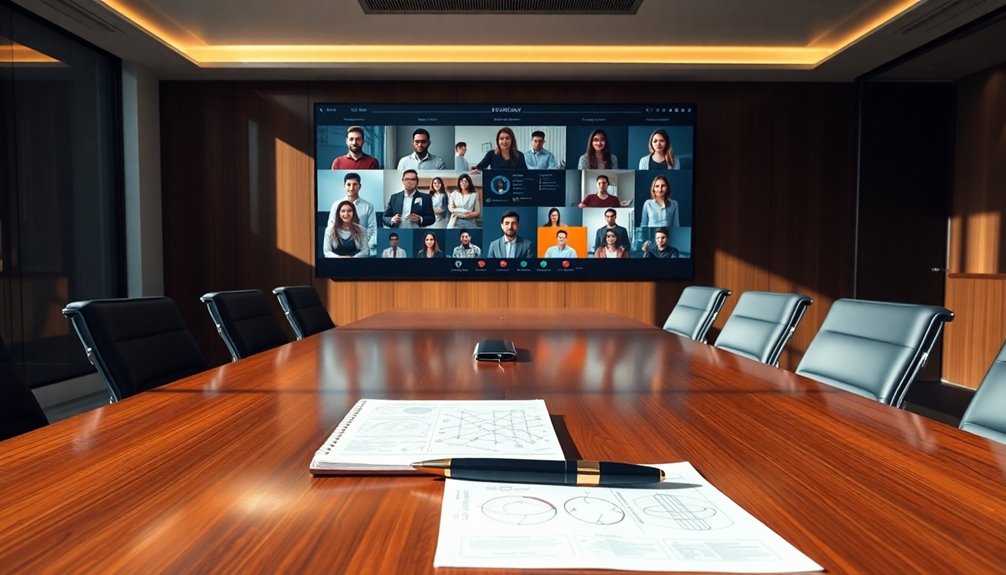
As you prepare for your business development interviews, it's crucial to understand the role of emerging interview technologies. Digital interview platforms are changing how candidates communicate, and being aware of cultural nuances can enhance your responses. Staying updated on current interviewing trends will give you a competitive edge in showcasing your skills effectively.
Digital Interview Platforms
Digital interview platforms are revolutionizing the hiring landscape, making it easier for companies and candidates to connect regardless of location. These platforms have surged in popularity, especially for remote hiring, allowing businesses to tap into a global talent pool. You'll find that many of these emerging technologies utilize AI-driven tools to analyze your responses, providing recruiters with valuable insights into your soft skills and personality traits through natural language processing.
Features like video recording, virtual reality simulations, and gamified assessments are designed to create a more engaging interview experience. This interactive approach not only showcases your abilities but also keeps you motivated during the evaluation process. Additionally, analytics tools embedded in digital interview platforms enable employers to track your performance and interaction metrics, helping them refine their selection criteria.
However, with the rise of digital interviewing, organizations are also prioritizing cybersecurity measures to safeguard your sensitive information and ensure compliance with data privacy regulations. Understanding these elements can help you navigate your interviews more effectively and present yourself in the best light possible. Embrace these innovations, and you'll be well-prepared for your next opportunity.
Cultural Nuances in Communication
Emerging interview technologies are reshaping how candidates showcase their communication skills, especially when it comes to understanding cultural nuances. As AI-driven assessment tools and video interviewing platforms become commonplace, you'll need to be aware of how different cultures interpret non-verbal cues and tone. Misunderstandings can easily arise during virtual interactions, making it essential to convey your message clearly.
Navigating these cultural nuances is crucial for effective communication in interviews. With potential misinterpretations of body language and facial expressions, you must adapt your approach to ensure clarity. Companies often use virtual role-playing scenarios to assess your ability to engage across various cultural contexts, so be prepared to demonstrate your adaptability.
Asynchronous video interviews are gaining traction, pushing you to be concise and culturally aware in your responses. Engaging with diverse interviewers means you must tailor your communication style, ensuring it resonates with their cultural perspectives. By honing your skills in recognizing and responding to cultural nuances, you'll not only enhance your interview performance but also present yourself as a well-rounded candidate ready to excel in a global business environment.
Current Interviewing Trends
Interviewing today is evolving rapidly, thanks to innovative technologies that change how we connect with employers. Emerging tools like AI-driven assessment platforms are now analyzing your responses, evaluating not just your qualifications but also your interpersonal skills. This means you need to be prepared to showcase your ability to communicate and collaborate effectively.
Video interview platforms have gained traction too, allowing you to record answers to pre-set questions at your convenience. This flexibility can help you present your best self. Additionally, companies are exploring virtual reality (VR) and augmented reality (AR) for interviews, simulating real-world scenarios where you can demonstrate your skills in a realistic environment.
Data analytics are also coming into play, with companies tracking performance metrics to refine their interview processes. This data-driven approach helps recruiters make informed decisions about candidates. With remote work on the rise, collaborative platforms are enhancing real-time feedback during virtual interviews, improving your overall experience.
As you prepare, remember that these technologies are here to supplement your interpersonal skills. Embrace them, and you'll stand out in the competitive landscape of business development.
Confidence and Mindset

Building unshakeable confidence is crucial for acing your business development interview. By adopting inspirational strategies and maintaining a positive mindset, you can transform your approach and enhance your performance. Let's explore how these elements can empower you to face challenges head-on and impress your interviewers.
Building Unshakeable Confidence
While preparing for a business development interview, confidence can make all the difference in how you present yourself and respond to questions. Building unshakeable confidence starts with thorough preparation. This means anticipating questions and crafting tailored responses, which can significantly boost your self-assurance.
Practice is key—engage in mock interviews and role-playing scenarios to develop a strong command over your communication skills. The more you practice, the more confident you'll feel when facing real interview situations. Additionally, research the company's mission, culture, and market position; this knowledge not only equips you with valuable insights but also instills a sense of ownership and belief in your fit for the role.
When discussing your achievements, be specific and focus on quantifiable successes. Highlighting your expertise reinforces your confidence in your abilities. Finally, demonstrate proactivity by presenting an action plan or innovative ideas during the interview. This showcases your readiness to contribute meaningfully to the organization and elevates your confidence even further. By focusing on these strategies, you'll build an unshakeable confidence that sets you apart as a candidate.
Inspirational and Motivational Strategies
A strong mindset can significantly enhance your interview performance, complementing the confidence you've worked hard to cultivate. By adopting effective motivational strategies, you can greatly improve how you present yourself. For instance, visualization techniques can help you picture success, potentially boosting your performance by up to 20%. Imagine walking into that interview fully prepared and confident.
Additionally, practicing affirmations that highlight your achievements can elevate your self-esteem, leading to assertive and impactful responses. When you remind yourself of your capabilities, you set a positive tone for the interview. Embracing a growth mindset is crucial as well; it encourages you to see challenges as opportunities for learning, boosting your resilience in competitive scenarios.
Don't underestimate the power of mindfulness either. Engaging in mindfulness practices before your interview can reduce anxiety levels by around 40%, allowing you to approach the situation with calmness and confidence. By integrating these motivational strategies into your preparation, you'll not only enhance your mindset but also significantly increase your chances of success in landing that senior director position.
Practice Active Listening Skills

In business development interviews, active listening is key to making a strong impression. You need to prepare not just your answers but also your approach to engaging with the interviewer. By focusing on their words and reflecting them back, you'll show that you value their insights and can think critically about the discussion.
Essential Items and Preparation
Three key strategies can elevate your active listening skills during business development interviews. First, maintain eye contact with your interviewer. This not only shows your engagement but also helps you connect with them on a deeper level. When you look someone in the eye, you encourage open communication, making it easier to understand their questions and concerns.
Next, practice nodding and using verbal affirmations like "I see" or "That makes sense." This reinforces that you're actively processing information and encourages the interviewer to elaborate on their points, which can reveal underlying meanings in their questions.
Finally, summarize what the interviewer has said before responding. This technique demonstrates your understanding and enables you to tailor your answers to address specific concerns. It also opens the door for insightful follow-up questions, showcasing your curiosity and interest in the role.
To refine your active listening skills, consider participating in mock interviews. This allows you to receive feedback on your engagement and communication techniques, ensuring you're well-prepared to impress in your actual interview. By honing these skills, you'll position yourself as a strong candidate for the Senior Director of Business Development role.
Final Preparation Steps
Mastering your active listening skills is a critical final preparation step for acing business development interviews. During your first interview, fully concentrating on the interviewer can significantly enhance communication and help you build rapport. Active listening means not just hearing the words but understanding and responding thoughtfully.
To practice, try summarizing what the interviewer says after they finish speaking. This shows you're engaged and allows you to clarify any points if needed. Ask clarifying questions to delve deeper into their insights, demonstrating your analytical skills and genuine interest. Don't forget to provide feedback, which can further showcase your interpersonal abilities.
Non-verbal cues matter, too. Nodding and maintaining eye contact signal your attentiveness and respect for the interviewer's perspective. These small gestures can make a big difference in how you're perceived.
Incorporating active listening into your mock interviews will prepare you for the real thing. The more you practice, the more confident and effective you'll become. Remember, active listening not only improves your responses but also creates a positive atmosphere in the interview, making you a standout candidate.
Interview Structure and Flow

The interview process for a Senior Director of Business Development is structured to thoroughly evaluate your skills and fit for the role. You can expect the interview structure to start with an HR interview lasting 15 to 30 minutes. This initial segment often involves the interviewer sharing their background and insights into the company's mission and values, which sets a collaborative tone for the discussion.
Following that, you'll face a more in-depth sales interview that can last between 50 to 90 minutes. This part may include role-playing scenarios designed to gauge your practical skills and decision-making abilities. Finally, a validation interview with another manager or the CEO will assess your fit for a leadership role within the organization.
Throughout the interview, there's a crucial segment where you'll get to ask questions. This isn't just a formality; it's your chance to demonstrate genuine interest and engagement in both the role and the company. To excel, prepare for classic interview questions and structure your responses clearly and relevantly. By understanding this interview structure, you'll be better equipped to navigate the process confidently.
Key Takeaways for Success

Consistently preparing for your interview can set you apart from other candidates vying for the Senior Director of Business Development position. Dedicate at least three hours to researching the company's mission, culture, and competitors. This knowledge allows you to tailor your responses effectively, showcasing your key skills in alignment with the company's goals.
Highlight specific, quantifiable achievements from your past roles. Mention percentage increases in sales metrics to illustrate the impact of your business development skills. Engaging in mock interviews can also enhance your confidence and readiness, especially in cold-calling and negotiation scenarios.
Don't forget to ask insightful questions about the company's sales cycles, current challenges, and lead qualification processes. This demonstrates your genuine interest in the role and shows that you're proactive.
Lastly, showcase your strategic thinking by presenting an action plan that includes tools and goals for business development. This reflects your readiness to contribute effectively from day one. Remember, your preparation and the ability to communicate your key skills can make a significant difference in securing the position.
Encouragement and Final Thoughts

Success in business development interviews is within your reach, and it starts with the right mindset. Embrace the journey of continuous learning; it's your best ally in boosting confidence and performance. Engage in mock interviews and role-playing scenarios to refine your responses, showcasing your proactive approach to potential challenges. This preparation not only sharpens your skills but also demonstrates your commitment to excellence.
Don't hesitate to ask insightful questions about the company's business development strategies and current challenges. This shows genuine interest and gives you deeper insights into the role. When discussing your achievements, highlight specific, quantifiable examples. This not only showcases your capability but aligns your experience with the company's goals.
Frequently Asked Questions
How to Pass a Business Development Interview?
To pass a business development interview, you need to prepare thoroughly. Research the company's mission and competitors, and dedicate time to tailor your responses. Highlight your quantifiable achievements, showcasing metrics like sales increases. Practice mock interviews to refine your cold-calling and negotiation skills. Ask insightful questions about the company's lead qualification process to demonstrate your interest. Finally, present a proactive action plan that outlines your goals and strategies for the role.
How Do Business Development Executives Excel?
Business development executives excel by honing your communication skills to build strong client relationships. You leverage an analytical mindset to assess market trends and tailor strategies that align with your company's goals. Proven resilience helps you handle rejection while staying motivated in a competitive landscape. Strategic thinking allows you to develop long-lasting relationships and effective growth plans. Lastly, continuous learning ensures you adapt to new industry trends, keeping you ahead in your role.
Why Do You Think You Will Excel in This Position?
You'll excel in this position because of your extensive experience in strategic partnerships and revenue growth. You've consistently increased sales and expanded markets, showcasing your analytical skills in assessing trends and customer needs. Your leadership inspires teams to perform better, fostering collaboration. With your negotiation prowess, you've closed high-stakes deals that benefit all parties. Plus, your deep understanding of industry dynamics helps you spot and seize emerging opportunities for growth effectively.
How Do You Pass a Director Interview?
To pass a director interview, you need to showcase your understanding of the company's mission and strategic goals. Use the STAR method to answer behavioral questions, illustrating your leadership skills with concrete examples. Highlight your success in developing business strategies and driving revenue growth. Don't forget to discuss your networking skills, and be prepared to ask insightful questions about the company's challenges and opportunities to show your genuine interest and strategic thinking.
Augustus is the visionary leader and Editor-in-Chief of Personality-Test.net. With an unwavering commitment to quality and authenticity, he oversees all content, ensuring it enlightens and empowers our audience. Augustus believes deeply in the transformative power of self-awareness and is dedicated to making Personality-Test.net a beacon for those on a journey to understand themselves better.
Job Interview
Unlocking Your Start Date: Key Insights
Key insights on revealing your start date can elevate your job prospects—discover how to navigate this critical aspect effectively!

Revealing your start date is essential to boosting your chances in the hiring process. First, evaluate your current job obligations and prepare a realistic availability timeline. Make sure to communicate your flexibility and willingness to start, as this reflects your professionalism and readiness. Add a touch of enthusiasm about the role and company culture to strengthen your position. Use clear responses like, "I can start after my notice period" to convey your readiness. By aligning your availability with the employer's needs, you can make a positive impression. Stick around for deeper insights on maneuvering this significant aspect of your job search!
Key Takeaways
- Clearly communicate your earliest start date based on current obligations and notice periods to align with employer needs.
- Show flexibility by expressing willingness to adjust your start date if necessary, emphasizing your eagerness for the role.
- Prepare for discussions by understanding the employer's preferred start date and aligning your availability accordingly.
- Highlight your enthusiasm for the position and company culture to positively influence hiring decisions.
- Provide concise and clear responses regarding your availability to demonstrate professionalism and readiness.
Importance of Start Dates

When it comes to hiring, understanding the importance of start dates is essential for both candidates and employers. A clear start date helps HR manage operations and align project timelines effectively.
If you're applying for a critical position, your availability could set you apart, showing your enthusiasm and commitment to the role. Employers rely on this information to plan onboarding and training sessions, ensuring a smooth shift for both you and the team.
Your response to start date inquiries can reveal your interest level and flexibility, which are attractive traits. By aligning your availability with the company's needs, you not only enhance your chances of getting hired but also pave the way for a successful start.
Preparing Your Availability
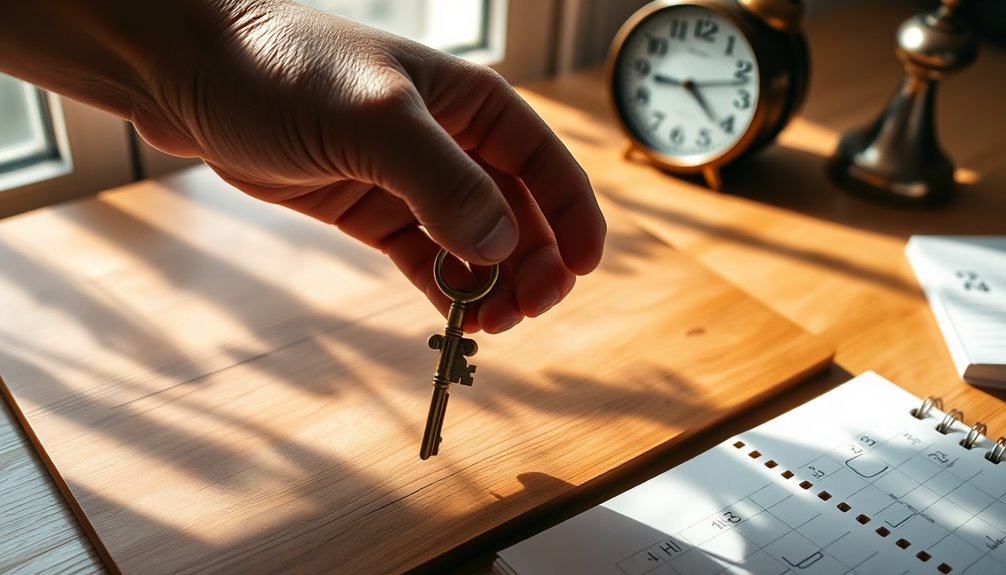
Before you discuss your start date with potential employers, it's crucial to prepare your availability accurately. Start by evaluating your current employment obligations and any personal commitments that might affect your start date.
Consider how much notice your current employer requires and be clear about any contractual obligations that could impact your timeline. It's wise to provide a conservative estimate for your earliest availability, keeping in mind that flexibility can appeal to employers.
Also, inquire about their preferred start date to align your availability with their needs. By preparing this information in advance, you'll demonstrate professionalism and readiness, making a positive impression on potential employers.
This preparation will facilitate a smoother discussion when the time comes.
Communicating Flexibility and Enthusiasm
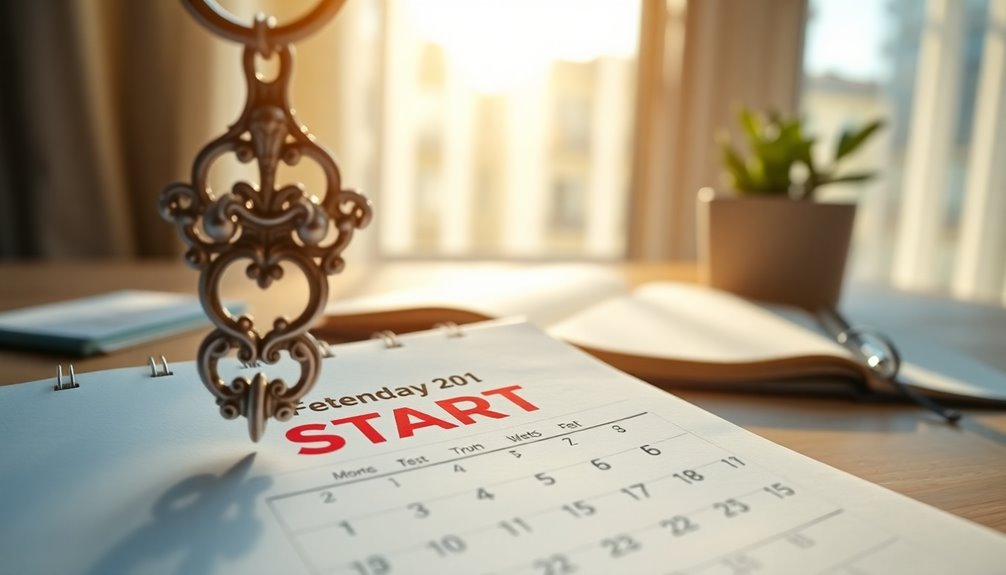
Once you've prepared your availability, it's important to communicate your flexibility and enthusiasm to potential employers. This approach not only showcases your keenness but also aligns your start date with their needs.
Here are a few ways to effectively convey your willingness:
- Indicate you're open to adjusting your start date if necessary.
- Share your excitement about the role and the company's culture.
- Highlight your readiness to accommodate their timeline.
- Emphasize how your budgeting skills can contribute to effective team management and project success.
Sample Responses for Availability
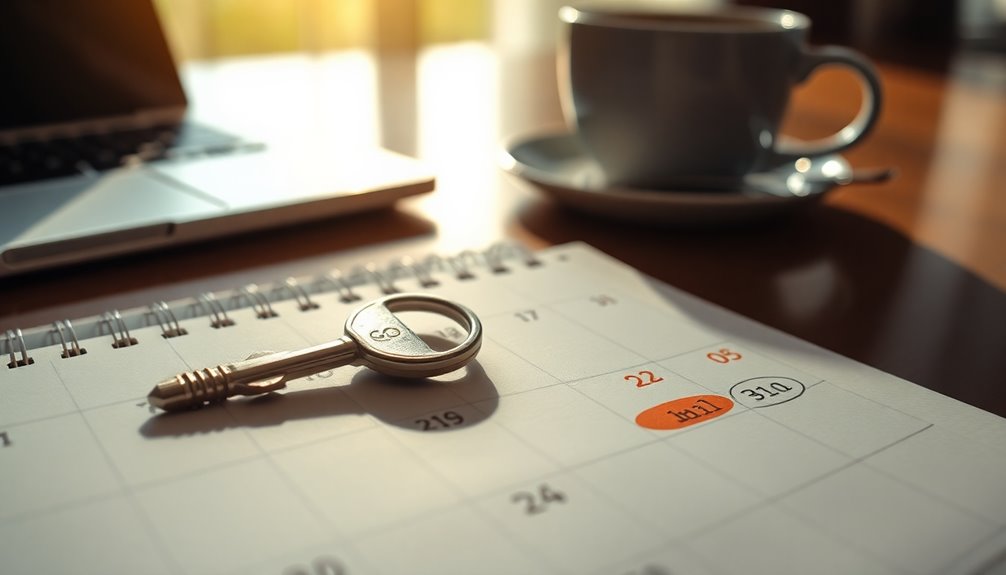
Effective communication about your availability can greatly influence your hiring prospects. When asked about your start date, tailor your response to reflect your situation while showing excitement.
For instance, you might say, "I'm available immediately if needed," which demonstrates enthusiasm. Alternatively, if you need a short adjustment, say, "I request a few days for preparation, but I'm flexible if you need me sooner."
If you have a notice period, clarify that: "My current notice requires two weeks, so I'd be available on [specific date]." If involved in a project, you can mention, "I'm finalizing a project and can start after [date]."
Keeping responses clear and concise will help potential employers understand your situation and appreciate your professionalism.
Additional Career Considerations
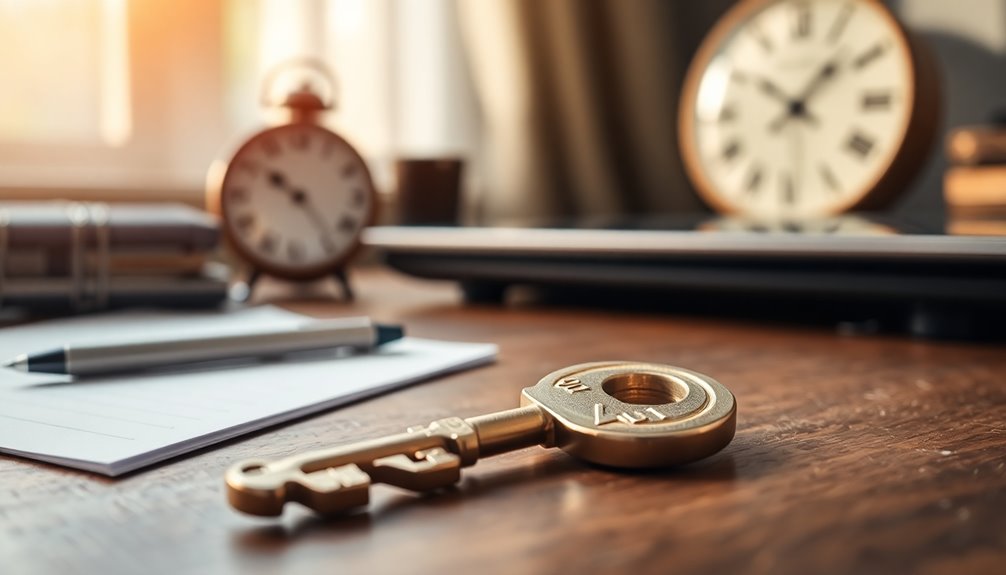
Steering your career often involves more than just securing a job; it requires careful consideration of various factors that can impact your long-term success and satisfaction.
Here are some essential aspects to think about:
- Workplace Dynamics: Be mindful of potential workplace jealousy; open communication helps foster a supportive environment.
- Career Growth: Explore college majors or skills aligned with strong job outlooks, especially in STEM and health-related fields.
- Flexibility in Career Paths: Consider second careers or opportunities in areas like corporate training or talent management if you're looking for new challenges. Developing strong communication skills can greatly enhance your ability to navigate these transitions effectively.
Frequently Asked Questions
How Can I Negotiate My Start Date Effectively?
To negotiate your start date effectively, assess your current commitments first.
Be clear about your availability and any notice period.
When discussing with the employer, maintain a calm demeanor and express your enthusiasm for the role.
Highlight your flexibility and willingness to adjust if needed.
Ask about their preferred start date, and provide a conservative estimate for your earliest availability.
Clear communication shows professionalism and enhances your appeal as a candidate.
What Should I Do if My Availability Changes?
If your availability changes, it's essential to communicate promptly.
Imagine a clock ticking down; each second matters. Reach out to your employer, explaining the new circumstances clearly and professionally.
Offer alternative start dates, and highlight your flexibility. This shows you're still enthusiastic to join the team and respect their needs.
Keeping the lines of communication open helps maintain a positive relationship and demonstrates your commitment to the position.
How Do I Assess My Obligations Realistically?
To assess your obligations realistically, start by listing your current commitments, including work, personal responsibilities, and any planned relocations.
Consider your notice period and any contractual obligations with your employer.
Be honest with yourself about what you can manage. This clarity helps you communicate your availability effectively.
Approach the conversation calmly, highlighting your flexibility while ensuring you're aware of what you can genuinely commit to without overwhelming yourself.
What Impact Does a Late Start Have on My Role?
Did you know that 60% of employers consider a candidate's start date when making hiring decisions?
A late start can delay project timelines and hinder HR operations, impacting team dynamics. It signals a lack of urgency and may affect your perceived interest in the role.
Additionally, it can complicate onboarding, training, and overall team preparedness.
Can I Request a Remote Start Date?
Yes, you can request a remote start date. Before doing so, consider your current obligations and how they might affect your availability.
When you communicate your preference, be clear and professional about your reasons for wanting a remote start. Highlight your readiness to engage with the team and contribute effectively, even from a distance.
This shows your enthusiasm for the role while accommodating any logistical constraints.
Conclusion
In the ever-shifting landscape of job hunting, your start date can be the golden key that opens up opportunity. By clearly communicating your availability and showcasing your enthusiasm to join the team, you transform yourself from just another applicant into a beacon of potential. Remember, flexibility is your ally; it can turn the tides in your favor. Embrace these strategies, and you'll not only navigate the hiring process with confidence but also pave your way toward that dream role.
Eugene brings a fresh, dynamic voice to our platform as one of our talented Writers. Specializing in research-driven content, he explores the latest findings in psychology and personal growth, translating them into actionable insights for our readers. Eugene’s work is fueled by a curiosity about what makes us tick and a desire to help others unlock their potential.
Job Interview
Thank You Job Interview Email: 8 Templates to Seal the Deal!
I found 8 powerful templates for thank you job interview emails that could make all the difference in your job search—don’t miss out on sealing the deal!
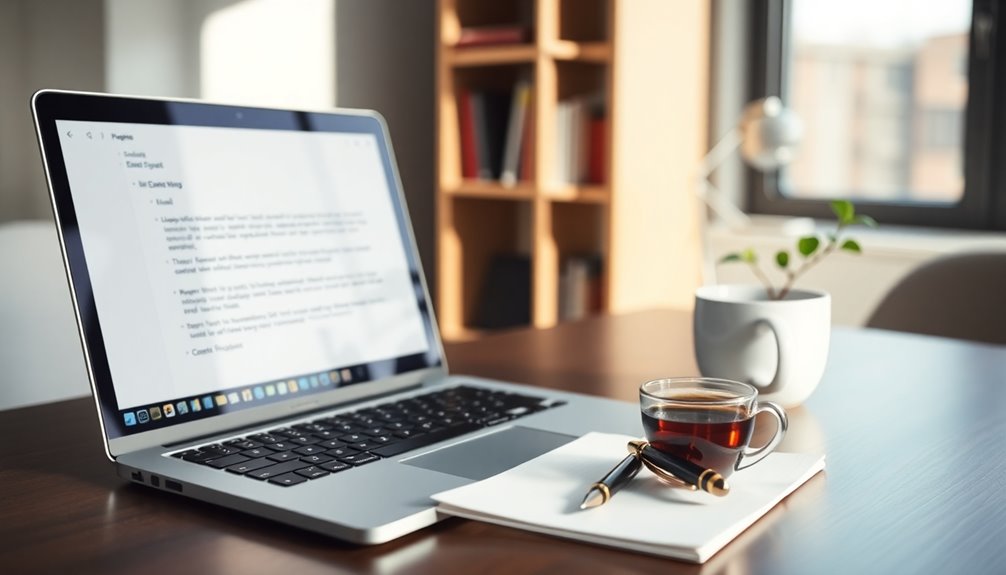
A well-crafted thank you email after your job interview can boost your chances of landing the position. It's best to send it within 24 hours to reinforce your interest and show your promptness. Make sure to personalize your message with specific details from the interview and express genuine gratitude. If you're addressing multiple interviewers, include everyone in the CC field. Keep your emails concise, professional, and error-free. By including key qualifications and a proactive follow-up strategy, you'll enhance your appeal. Discover practical templates tailored for various scenarios to elevate your communication and make a lasting impression!
Key Takeaways
- Timely thank you emails sent within 24 hours enhance your chances of leaving a positive impression on hiring managers.
- Personalize your message by mentioning specific topics discussed during the interview to demonstrate engagement and attentiveness.
- Incorporate a clear subject line, such as "Thank You for the [Position] Interview," for easy identification by the recipient.
- Keep your emails concise, ideally two to three paragraphs, to maintain readability and ensure your key points are communicated effectively.
- Consider templates for various situations, including follow-ups and responses to rejections, to streamline your communication process.
Importance of Thank You Emails

In today's competitive job market, sending a thank you email after an interview isn't just polite; it's essential. When you send a thank you note, you're not only expressing gratitude for the interviewer's time but also reinforcing your interest in the position. This simple gesture can enhance your professional image and even open up networking opportunities.
Research shows over 80% of hiring managers find thank you notes helpful in their decision-making process. In fact, 22% are less likely to hire candidates who don't send them. By sending a thank you email within 24 hours post-interview, you demonstrate promptness and enthusiasm, ensuring you remain fresh in the interviewer's memory.
Moreover, thank you emails give you the chance to clarify points discussed during the interview and share any additional relevant projects. This further highlights your qualifications and keeps the conversation going. Remember, in a competitive job market, the act of sending a thank you note can differentiate you from other candidates. With 91% of hiring managers appreciating the courtesy of a thank you note, you're not just following up; you're making a strategic move in the interview process.
Best Timing to Send
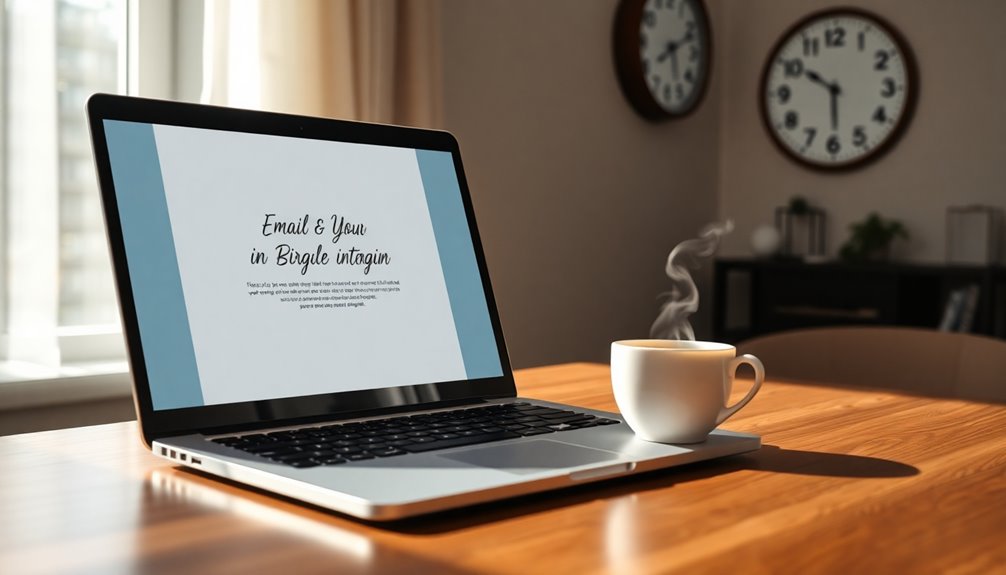
Sending your thank you email promptly is key to making a lasting impression. Aim to send your email within 24 hours after the interview. This shows your enthusiasm for the job and keeps you fresh in the interviewer's mind. Remember, hiring decisions can happen quickly, especially in competitive markets. A well-timed thank you can greatly influence their decision-making process.
Here's a quick guide on the best timing to send your thank you email:
| Time Frame | Action | Impact |
|---|---|---|
| Within 24 Hours | Send your thank you email | Reinforces interest, shows promptness |
| 24 to 48 Hours | Send if not already done | Still valuable, but diminishing impact |
| Beyond 48 Hours | Consider carefully | Risk of being forgotten |
You want to express gratitude effectively. If you can't send it within the ideal timeframe, focus on crafting a quality email. It's better to send a thoughtful message later than to skip it altogether. Ultimately, you want to look forward to hearing back from them, and a timely thank you email can help achieve that.
Key Elements to Include
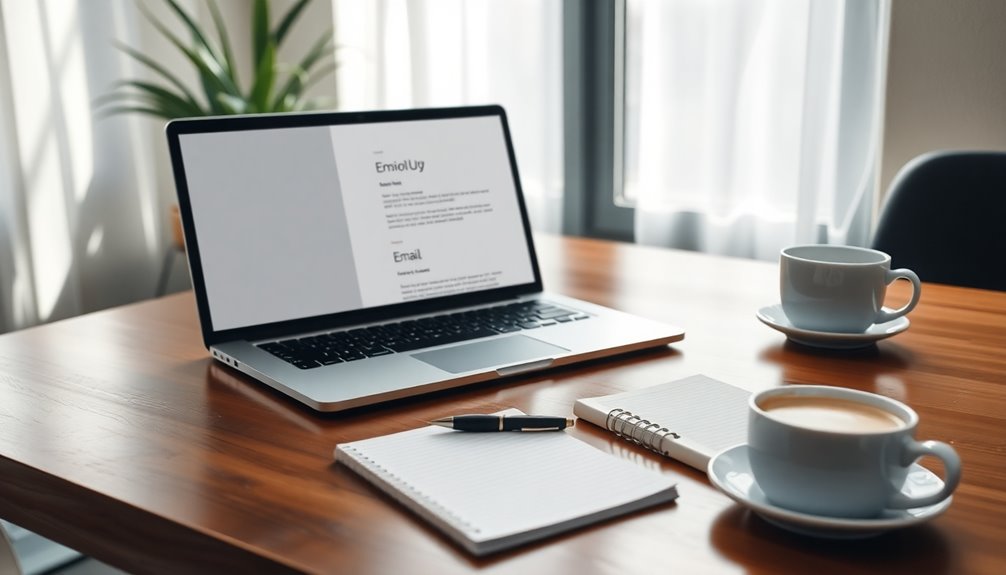
Crafting an effective thank you email is essential for leaving a positive impression after your interview. To guarantee you include all the key elements, consider the following:
- Clear Subject Line: Make it specific, like "Thank You for the [Position] Interview," to convey the email's purpose.
- Personalized Greeting: Start with a warm address using the interviewer's name, adding a personal touch.
- Express Gratitude: Sincerely thank them for the opportunity and mention specific topics from the interview to show you were engaged.
- Reiterate Interest in the Position: Highlight your enthusiasm for the role and the company, aligning your skills with their needs.
- Contact Information: Include your contact details in case they need to reach you for any follow-up.
These elements combined will create a strong thank you email that reinforces your fit for the role and keeps you in the interviewer's mind for the next job interview. End with a professional sign-off, expressing anticipation for future communication and offering any additional information if needed. A well-crafted email can make all the difference!
Addressing Multiple Interviewers
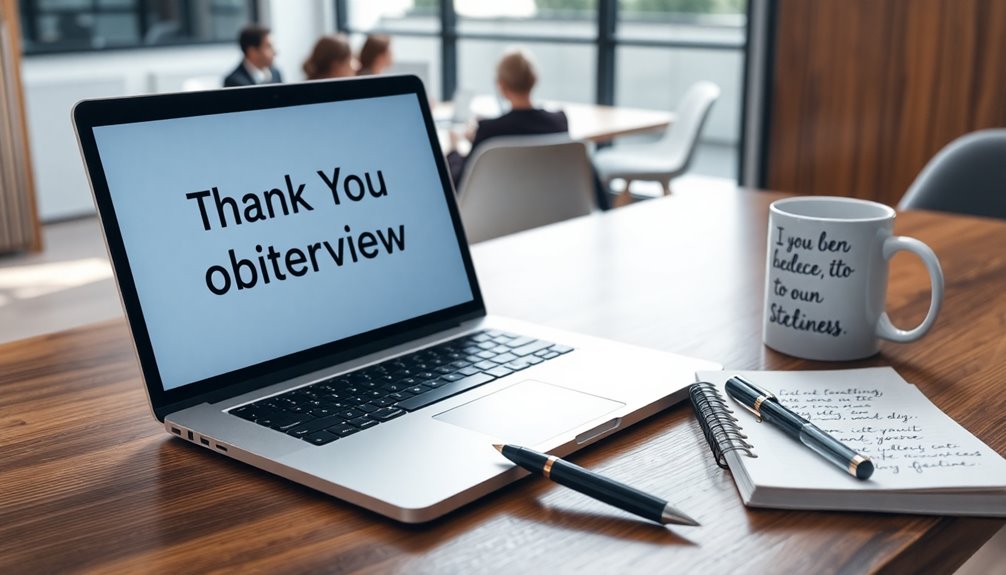
Addressing multiple interviewers requires a thoughtful approach to guarantee everyone feels acknowledged. When you send your thank you email after they took the time to interview you this morning, make sure to include all interviewers' names in the CC field. This not only maintains professionalism but also reinforces your collaborative spirit.
In your email, personalize your message by mentioning each interviewer's specific contributions or insights. For instance, if one interviewer discussed the team dynamics related to the position, highlight that in your email. This shows you value their input and enhances your connection.
A collective thank you email allows you to express gratitude to all interviewers and appreciate their unique perspectives without overwhelming them with excessive detail. Keep your message concise and focused, ensuring it aligns with the job search process.
If anyone has follow-up questions or needs clarification, feel free to contact you. By taking these steps, you'll leave a lasting impression and show your enthusiasm for the opportunity. Remember, acknowledging multiple interviewers effectively can set you apart from other candidates in your job search.
Formatting Best Practices
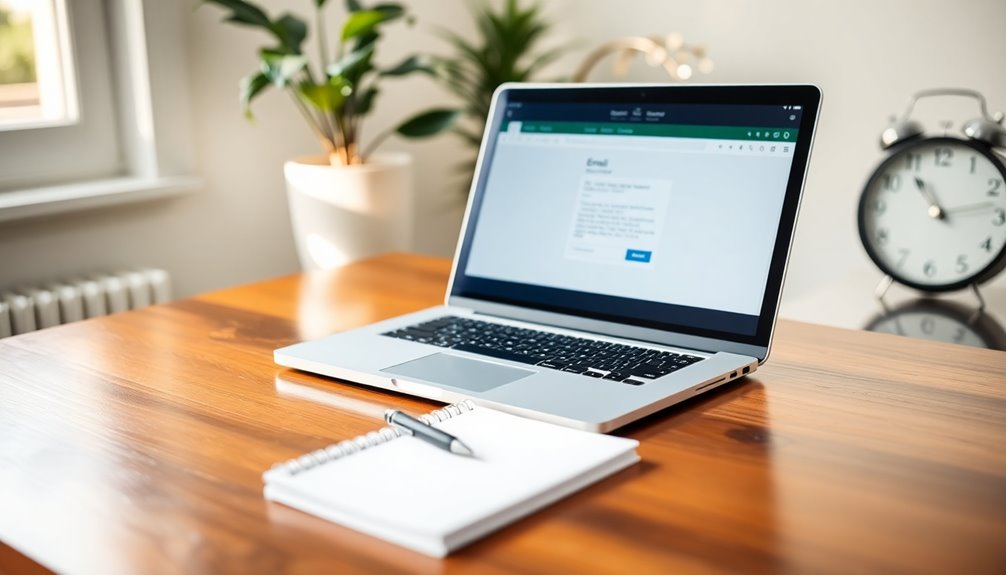
A well-formatted thank you email can make a significant difference in how your message is received. To guarantee your note stands out, follow some basic formatting best practices. Aim to send your email within 24 hours of the interview, expressing your pleasure in speaking with the interviewer. Here are some tips to help you craft a polished email:
- Use a clear and specific subject line, like "Thank You for the [Position] Interview."
- Maintain a professional tone that reflects the company's culture.
- Keep the email concise, ideally two to three paragraphs, and guarantee that each sentence serves a purpose.
- Utilize proper formatting for readability, including appropriate spacing and paragraphs to enhance visual appeal.
- Proofread your email thoroughly to eliminate any spelling or grammatical errors.
Highlighting Your Qualifications
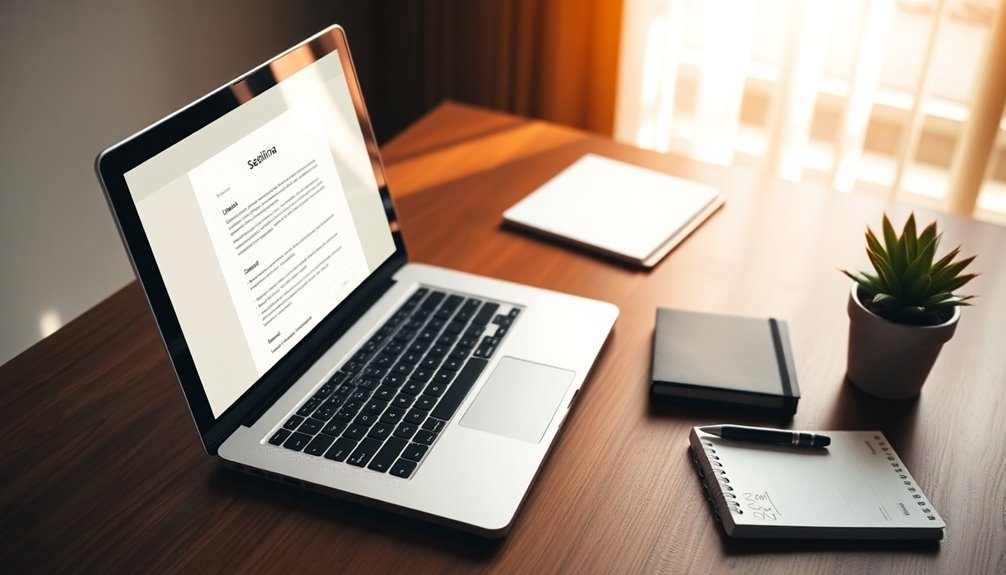
When you send your thank you email, make sure to emphasize your relevant skills that match the job description. Including links to your portfolio can effectively showcase your past work and reinforce your qualifications. This not only highlights your fit for the position but also demonstrates your proactive approach in the hiring process.
Relevant Skills Emphasis
In the fast-paced world of job interviews, highlighting your relevant skills can set you apart from other candidates. After your interview, take the time to craft a thoughtful email that emphasizes your key qualifications, reinforcing your fit for the role. Here are some effective strategies to take into account:
- Align your qualifications with the job description.
- Mention skills or experiences not discussed during the interview.
- Use specific examples that demonstrate your problem-solving abilities.
- Provide tangible evidence, like links to your professional portfolio.
- Convey confidence in your abilities and fit for the position.
When writing your email after an interview, remember to focus on those relevant skills that resonate with the discussions you had. By doing so, you not only remind the interviewer of your qualifications but also showcase your proactive attitude. For instance, if you solved a significant challenge in your previous role, mention it. This will make your qualifications more memorable. With the right approach, your email can reinforce your candidacy and leave a lasting impression that propels you forward in the hiring process.
Portfolio Links Inclusion
Highlighting your qualifications can be markedly enhanced by including links to your professional portfolio in your thank you email. By doing so, you're taking the opportunity to showcase your relevant work and skills directly tied to the position. This not only reinforces your qualifications but also helps you stand out among other job seekers.
When you craft an email, include specific examples of projects that align with the topics discussed during the interview. This approach reflects your proactive nature and shows you've paid attention to the conversation. Additionally, by integrating portfolio links, you facilitate further discussion about your work, which keeps the conversation going and increases your chances of moving forward in the hiring process.
Incorporating links to your portfolio also demonstrates your tech-savviness and understanding of modern professional communication. It can positively influence the interviewer's perception of your expertise and professionalism, particularly in companies that value a strong social media presence and innovative company culture. As you send off your thank you email, be sure to express that you're looking forward to hearing from them while inviting any additional information they might need to make a decision.
Follow-Up Strategies
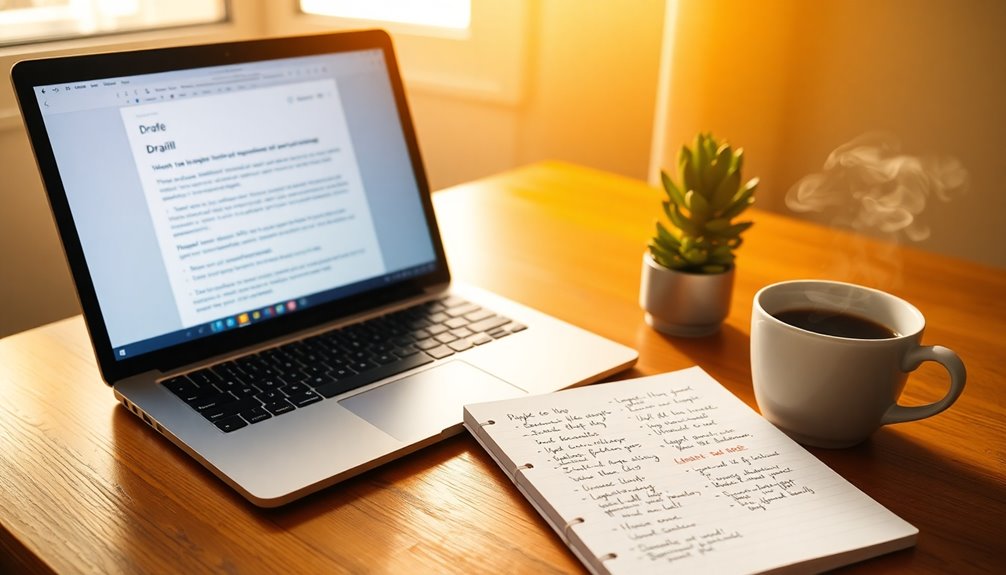
Utilizing effective follow-up strategies can considerably enhance your chances of leaving a lasting impression after a job interview. If you haven't heard back after sending your initial thank-you email, it's time to meet that opportunity head-on. Here are some key strategies to reflect on:
- Wait at least one week before sending a follow-up email.
- Reiterate your enthusiasm for the manager position, highlighting specific points from your interview.
- Politely inquire about the status of your application process.
- Maintain a professional tone, offering to provide any additional information if needed.
- Personalize your message by referencing topics you enjoyed discussing during the interview.
- Consider sharing how your skills align with the company's goals, as establishing common goals can foster collaboration and leave a memorable impression.
Templates for Every Situation
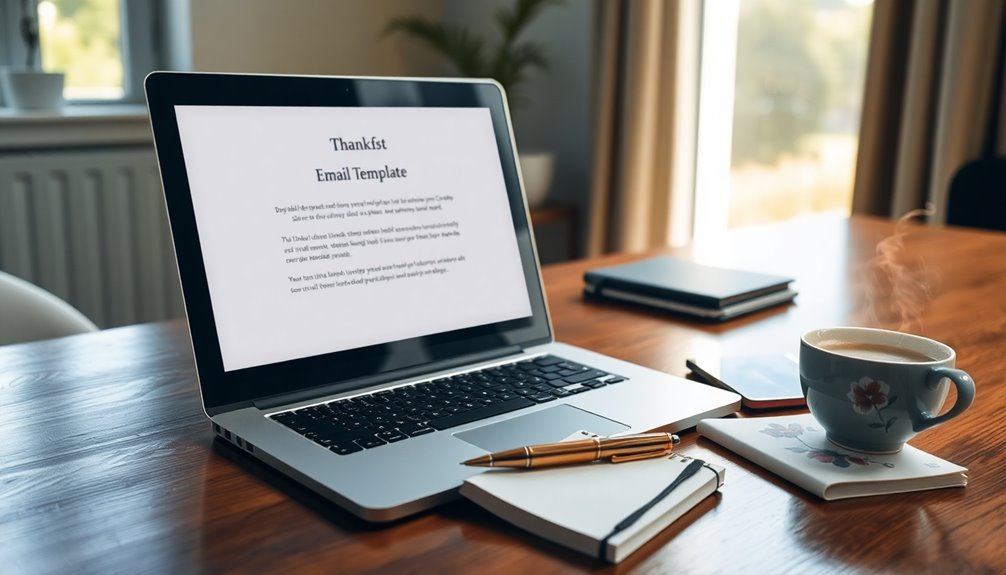
After you've followed up on your interview, having well-crafted templates ready for different situations can streamline your communication and guarantee you make the right impression. For your Post-Interview Thank You Note, make certain to include a clear subject line, a personalized greeting, and references to something specific discussed during the interview. This reinforces your connection and shows you were engaged.
Feel free to send tailored emails based on the interview's tone and content. Reflect the company culture and your unique interactions, which can positively influence the hiring process. If you don't receive a response after your initial thank you, have a follow-up email template ready. This should maintain professionalism while expressing your continued interest in the position.
If you interviewed with multiple people, create a template that guarantees each recipient gets a personalized message, showcasing your professionalism. Finally, prepare a rejection response template that graciously thanks the interviewer for the opportunity while expressing interest in future roles. This approach helps you maintain a positive relationship and keeps the door open for potential job offers down the line.
Frequently Asked Questions
How to Write a Thank You Email After Interview Template?
To write a thank you email after your interview, start with a clear subject line like "Thank You for the [Position] Interview." Address the interviewer personally, expressing your gratitude for the opportunity. Mention specific topics you discussed, reinforcing your excitement for the role. Highlight your relevant skills that align with the company's needs. Conclude with a professional sign-off and express your readiness to hear back, making your email memorable and impactful.
How Do You Write a Killer Thank You Note After an Interview?
To write a killer thank you note after an interview, start by sending it within 24 hours. Personalize it by mentioning specific topics you discussed, showing you were engaged. Keep it concise, ideally two to three paragraphs, expressing gratitude for the opportunity and reiterating your fit with the company's values. Avoid generic phrases and errors; make every sentence count to leave a lasting impression on your interviewer.
How Do You Write a Thank You Email to Multiple Interviewers?
When you write a thank you email to multiple interviewers, make certain to include all their names in the CC field. This shows respect and guarantees everyone feels acknowledged. Personalize your message by mentioning specific topics discussed with each interviewer, enhancing your connection. Aim to send the email within 24 hours to demonstrate enthusiasm. Keep a cohesive tone, and express gratitude while reiterating your interest in the position.
How to Write a Professional Thank You for the Opportunity Email?
To write a professional thank you email, start with a personalized greeting. Express your gratitude for the opportunity and mention specific topics from the interview to show your engagement. Highlight your qualifications and any unique contributions you can offer. Keep it concise, ideally two to three paragraphs, and make certain every sentence adds value. Conclude with a professional sign-off, expressing your enthusiasm for future communication and inviting follow-up questions.
Conclusion
Sending a thank you email is like planting a seed in a garden; it nurtures your connection and keeps you fresh in the interviewer's mind. By expressing gratitude, timing it right, and highlighting your qualifications, you increase your chances of blossoming into the ideal candidate. Remember, the right follow-up can turn a good impression into a lasting one. So, take a moment to craft your message and watch your opportunities grow!
Felicity, our Author, pens in-depth articles and guides that delve into the heart of personal discovery. Her narrative-driven approach weaves together theory, practice, and personal anecdotes, making the journey of self-exploration both relatable and inspiring. Felicity’s contributions help illuminate the path for those seeking a deeper understanding of themselves and their relationships.
Job Interview
Mastering Promotion Interviews: Essential Insights
In mastering promotion interviews, learn the essential insights that can elevate your career, but what key strategies will set you apart from the competition?
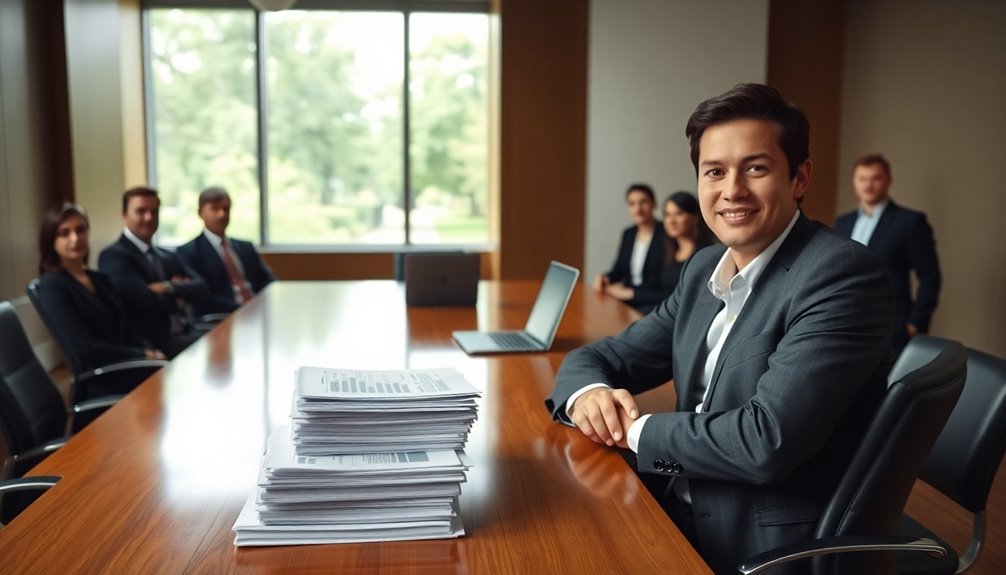
Mastering promotion interviews means being well-prepared and strategically showcasing your achievements. Start by reflecting on your goals like salary and growth. Engage with colleagues to understand promotion standards, and discuss your ambitions with your manager for transparency. Create a strong case by compiling your accomplishments and aligning them with the job description. Practice common interview questions and prepare a focused action plan. During the interview, present your case confidently and listen to feedback. If you face rejection, respond professionally and seek constructive criticism. There's more to uncover about the nuances of this process to guarantee your success.
Key Takeaways
- Clearly articulate your personal expectations regarding salary, recognition, and growth during the promotion interview.
- Compile specific examples of accomplishments that demonstrate your readiness for the new role.
- Research the job description and align your skills with the responsibilities and company values.
- Prepare to answer common interview questions while showcasing your strengths and contributions.
- Engage actively with management, listen to feedback, and be open to development suggestions.
Preparing for Promotion Discussions
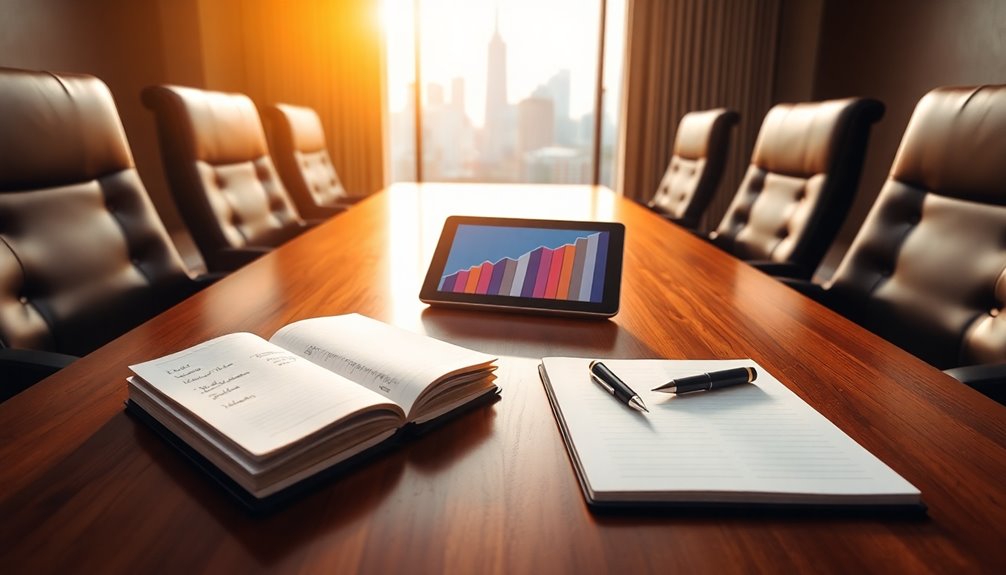
When gearing up for promotion discussions, it's vital to take a step back and reflect on what you truly want from the opportunity.
Consider your personal expectations, like salary, recognition, and growth. Engage with senior colleagues to gain insights into what's typically expected for promotions.
Be clear about whether you're seeking a salary increase or support in other forms. Think about your preferences: do you want more management responsibilities, or do you prefer focusing on individual contributions?
It's also important to discuss your intentions with your current manager for transparency and feedback.
Finally, research the new role thoroughly, including daily tasks and required skills, to guarantee your aspirations align with the company's mission and values. Additionally, understanding your company's leadership values can help you effectively communicate your alignment with their goals during the promotion discussion.
Building a Strong Case

To secure a promotion, you need to build a strong case that clearly demonstrates your qualifications and contributions. Start by researching the average salaries for the desired position to establish a factual basis for your request.
Review your current performance metrics and compare them against job expectations, identifying specific strengths. Compile examples of how you've exceeded your role's responsibilities, highlighting measurable achievements.
Create a portfolio showcasing these successes, as tangible evidence strengthens your argument. Clearly articulate your reasons for seeking the promotion, backed by data and metrics.
Finally, analyze the job description to illustrate how you've already taken on additional responsibilities, emphasizing your readiness for the new role. Additionally, consider establishing clear savings goals that can demonstrate your commitment to long-term planning, which may resonate with management's priorities. This thorough approach will make your case compelling.
Promotion Interview Preparation
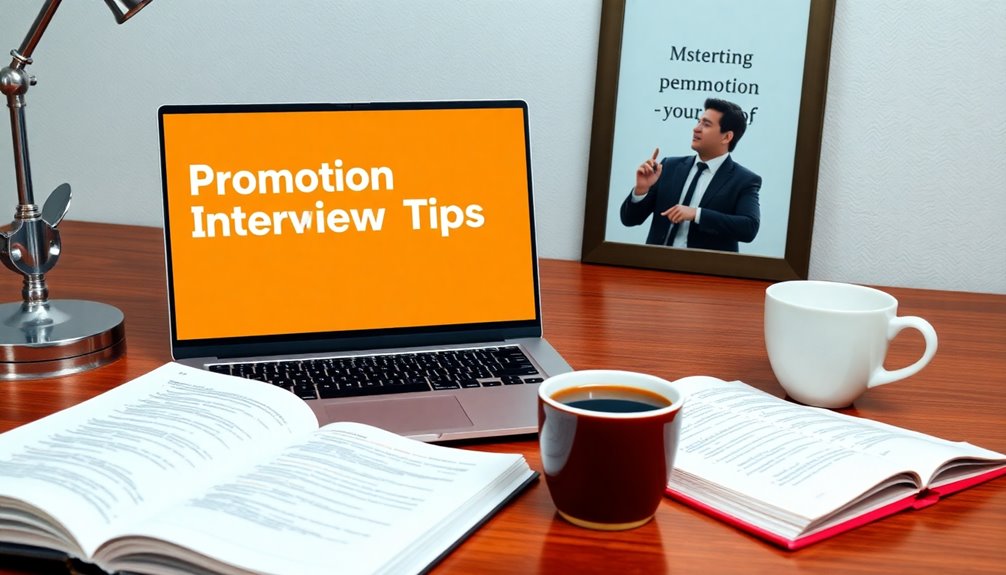
Preparing for a promotion interview requires careful attention to detail and a proactive mindset. Start by reflecting on your accomplishments and how they align with the new role's responsibilities. Research the position thoroughly, noting required skills and daily tasks. Here's a quick table to help you organize your preparation:
| Focus Area | Action Steps |
|---|---|
| Personal Expectations | Identify salary, recognition, and growth |
| Research the Role | Review job description and company values |
| Accomplishments | Compile examples of past successes |
| Common Questions | Prepare answers for typical interview queries |
Engaging With Management

Engaging with management effectively is essential for a successful promotion discussion. Start by scheduling a dedicated meeting, signaling the importance of your conversation. Use a clear title, like "Growth Discussion," to set the tone.
Prepare for potential questions or concerns they might raise. Demonstrate your understanding of the company's goals and how you can contribute to them in your new role.
Be direct and confident in presenting your case, highlighting your accomplishments and readiness for increased responsibilities. Listen actively to their feedback, showing you're open to their insights.
Incorporating data-driven decision-making into your discussions can further illustrate your strategic thinking and alignment with the company's vision.
This approach not only showcases your commitment to growth but also builds a positive rapport with management, reinforcing your suitability for the promotion.
Handling Rejection Professionally

Receiving a rejection after a promotion discussion can be disheartening, but how you handle it can make a significant difference in your professional journey.
First, take a moment to process your feelings—it's natural to feel disappointed. Once you're ready, respond professionally. Thank your manager for the opportunity and express your commitment to growth.
Ask for specific feedback on your performance and what skills you can develop for future consideration. Setting SMART goals based on this feedback shows your dedication.
Keep the lines of communication open, demonstrating your willingness to learn.
Finally, focus on your current role—continue delivering high-quality work and supporting your team. This proactive approach not only enhances your skills but also positions you favorably for future opportunities.
Impact on Work Relationships

Although promotions can elevate your career, they can also shift dynamics within your team. You might find that your relationships with colleagues change as they adjust to your new role.
To navigate this, maintain open communication. Be transparent about your goals, and show your willingness to support your team. Acknowledge their contributions and foster an inclusive environment, as this will help build trust.
It's important to avoid any perception of favoritism; treat all team members fairly. Additionally, consider mentoring others to strengthen bonds and enhance collaboration. Establishing trust issues can hinder teamwork, so addressing concerns openly will promote a healthier work environment.
Setting Future Goals

How do you guarantee your future goals align with your new role after a promotion? Start by identifying specific, actionable objectives that not only reflect your aspirations but also meet the company's expectations.
Break down your goals into short-term and long-term targets, making sure they resonate with the responsibilities of your new position. Engage regularly with your team and management to assure alignment and gather feedback.
Focus on fostering team morale and encouraging collaboration, as these will enhance your leadership effectiveness. Finally, commit to continuous learning and development to adapt to evolving challenges. Additionally, prioritizing self-care practices can help maintain your well-being and performance in your new role.
Frequently Asked Questions
What Should I Wear to a Promotion Interview?
For your promotion interview, you'll want to dress professionally to reflect your seriousness about the opportunity.
Choose a tailored suit or a smart dress that aligns with your company's culture. Stick to neutral colors for a polished look, and make certain your clothes are clean and pressed.
Pay attention to your shoes; they should be formal and comfortable.
How Can I Manage Nerves Before the Interview?
Did you know that around 70% of people experience anxiety before interviews?
To manage your nerves, practice deep breathing exercises to calm your mind.
Visualize a successful interview to boost your confidence.
Prepare thoroughly by reviewing your accomplishments and the role's requirements.
Engage in mock interviews with a friend to simulate the experience.
Finally, remember, it's just a conversation about your future; focus on sharing your value and passion for the role.
Should I Bring a Copy of My Resume?
Yes, you should definitely bring a copy of your resume to the promotion interview.
It serves as a handy reference for both you and the interviewers. Your resume highlights your achievements and qualifications, reinforcing your case for promotion.
Plus, it shows you're prepared and professional. Even if they've it on file, having a copy on hand can help you discuss your experiences and contributions more effectively during the conversation.
How Long Should My Promotion Interview Last?
Your promotion interview should ideally last between 30 to 60 minutes.
This timeframe allows you to discuss your accomplishments, aspirations, and fit for the new role while giving your manager space to ask questions.
Keep your answers concise but thorough, ensuring you cover key points without rambling.
If conversations flow naturally, it's okay to extend a bit, but aim to respect everyone's time and maintain focus on the promotion discussion.
Can I Negotiate My Salary After Receiving a Promotion Offer?
Yes, you can negotiate your salary after receiving a promotion offer.
It's important to approach the conversation professionally and confidently. Start by researching industry standards and your company's compensation trends.
Clearly articulate your value, highlighting your achievements and the additional responsibilities you'll take on.
Be open to discussing other benefits too, like bonuses or extra vacation days, if salary flexibility is limited.
A respectful dialogue can lead to a favorable outcome for both parties.
Conclusion
As you gear up for your promotion interview, remember that preparation is your strongest ally. Like a well-tuned instrument, your confidence and clarity will resonate during the discussion, showcasing your readiness for new challenges. Embrace the insights you've gathered, articulate your achievements, and engage genuinely with your interviewers. Regardless of the outcome, each experience sharpens your skills and sets the stage for future success. Trust in your abilities, and let your passion shine through.
Eugene brings a fresh, dynamic voice to our platform as one of our talented Writers. Specializing in research-driven content, he explores the latest findings in psychology and personal growth, translating them into actionable insights for our readers. Eugene’s work is fueled by a curiosity about what makes us tick and a desire to help others unlock their potential.
-

 Love Compatibility between Zodiac Signs2 months ago
Love Compatibility between Zodiac Signs2 months agoRat Compatibility in the Chinese Zodiac: Which Signs Are the Perfect Match?
-

 Love Compatibility between Zodiac Signs2 months ago
Love Compatibility between Zodiac Signs2 months agoCat Zodiac Compatibility: Which Signs Are Most Compatible With Cats?
-

 Love Compatibility between Zodiac Signs3 months ago
Love Compatibility between Zodiac Signs3 months agoThe Ultimate Guide to Throuple Zodiac Compatibility
-

 Love Compatibility between Zodiac Signs3 months ago
Love Compatibility between Zodiac Signs3 months ago10 Mother-Daughter Zodiac Combinations That Have Natural Compatibility
-

 Love Compatibility between Zodiac Signs2 months ago
Love Compatibility between Zodiac Signs2 months agoHow to Assess Snake Compatibility in the Chinese Zodiac
-

 Love Compatibility between Zodiac Signs1 month ago
Love Compatibility between Zodiac Signs1 month agoDiscover Your Family's Zodiac Compatibility With This Calculator
-

 Love Compatibility between Zodiac Signs1 month ago
Love Compatibility between Zodiac Signs1 month agoChinese Zodiac Compatibility: How Does the 1957 Year of the Rooster Interact With Other Signs?
-

 Love Compatibility between Zodiac Signs3 months ago
Love Compatibility between Zodiac Signs3 months agoOctober 22 Zodiac Compatibility: Who Is the Perfect Match for Your Sign?



